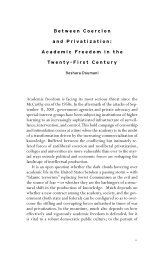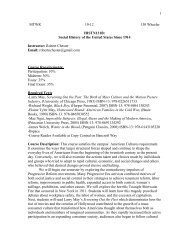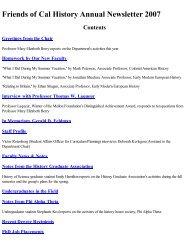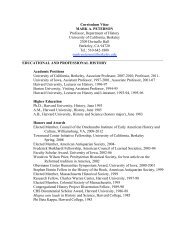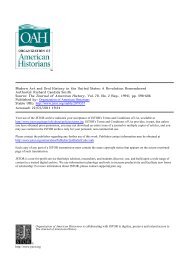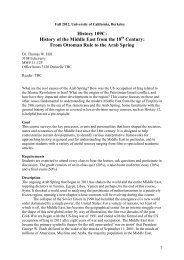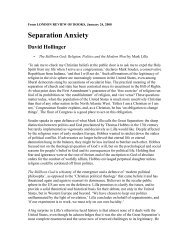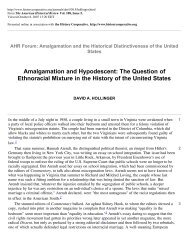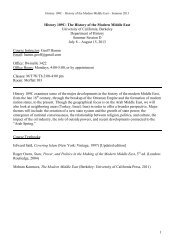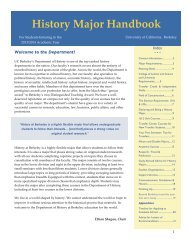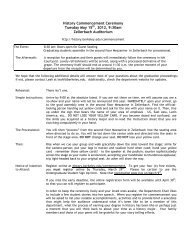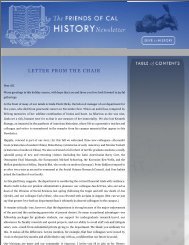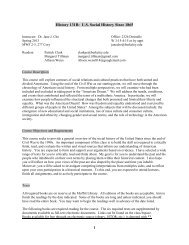My Grandmother and Other Stories: Histories of the Palestinians as ...
My Grandmother and Other Stories: Histories of the Palestinians as ...
My Grandmother and Other Stories: Histories of the Palestinians as ...
Create successful ePaper yourself
Turn your PDF publications into a flip-book with our unique Google optimized e-Paper software.
efore our return to Majd al-Kroum. 37 <strong>My</strong> personal memories <strong>of</strong> my gr<strong>and</strong>mo<strong>the</strong>r<br />
Zahra in <strong>the</strong> ‘50s are intermittent, linked to our visits on holidays <strong>and</strong> special<br />
occ<strong>as</strong>ions. I most remember her little home near <strong>the</strong> home <strong>of</strong> Uncle Ahmad, Abu<br />
Ma’yuf’s youngest son. <strong>My</strong> gr<strong>and</strong>mo<strong>the</strong>r worked <strong>as</strong> a w<strong>as</strong>herwoman for Jewish<br />
families in Haifa with her divorced daughter Sa’da, before <strong>the</strong> latter remarried in <strong>the</strong><br />
late 1950s. Some advised her to quit this work because <strong>of</strong> her advanced years. <strong>My</strong><br />
gr<strong>and</strong>mo<strong>the</strong>r told <strong>the</strong>se “advisors”–some <strong>of</strong> whom were her children–that she would<br />
ra<strong>the</strong>r she <strong>and</strong> her daughter put food on <strong>the</strong> table through <strong>the</strong>ir own toil <strong>and</strong> sweat<br />
than to have to <strong>as</strong>k anything <strong>of</strong> anyone. It seems her children were embarr<strong>as</strong>sed by<br />
<strong>the</strong>ir mo<strong>the</strong>r’s work but <strong>the</strong>y did not have much <strong>of</strong> an alternative. Jobs were scarce<br />
in those days during <strong>the</strong> years <strong>of</strong> military rule <strong>and</strong> each had a family <strong>and</strong> children to<br />
provide for. 38 I, however, w<strong>as</strong> on my gr<strong>and</strong>mo<strong>the</strong>r’s side. At le<strong>as</strong>t every time I visited<br />
her, especially on holidays, she w<strong>as</strong> ready with holiday money, which always makes<br />
children happy.<br />
Epilogue<br />
Zahra al-Ja’uniyya died on 6 March, 1968. This date is on her gravestone <strong>and</strong> w<strong>as</strong><br />
registered in Abu Jamil’s record book. In <strong>the</strong> days that followed <strong>the</strong> Naksa <strong>of</strong> June<br />
1967, I w<strong>as</strong> busy with work <strong>and</strong> saving some money before my university cl<strong>as</strong>ses<br />
began. During my m<strong>as</strong>ter’s studies in Jerusalem, I met a university student who would<br />
become my wife <strong>and</strong> <strong>the</strong> mo<strong>the</strong>r <strong>of</strong> my children. For <strong>the</strong> first time, I travelled to meet<br />
Aziza’s family–first to Safad <strong>and</strong> <strong>the</strong>n to ‘Akbara, which w<strong>as</strong> an extremely modest<br />
village to <strong>the</strong> south <strong>of</strong> <strong>the</strong> Safad government hospital. These regions were not familiar<br />
to me despite <strong>the</strong>ir close proximity to Ja’uni, which I had not yet visited.<br />
This trip turned out to be an adventure I will never forget. I w<strong>as</strong> successful in <strong>as</strong>king<br />
<strong>and</strong> receiving Aziza’s h<strong>and</strong> in marriage. But it also opened up a new window for me in<br />
underst<strong>and</strong>ing <strong>the</strong> course <strong>of</strong> events in <strong>the</strong> Safad region. I found out that Abu Hussein,<br />
my wife’s fa<strong>the</strong>r, knew Mano Friedman from Rosh Pina. <strong>My</strong> wife’s family w<strong>as</strong><br />
originally from Qaditha, not far from Ja’uni. So ultimately I heard from my fa<strong>the</strong>rin-law<br />
that he also once had a business relationship with Mano Friedman during <strong>the</strong><br />
British M<strong>and</strong>ate period, <strong>and</strong> even after <strong>the</strong> establishment <strong>of</strong> Israel. Unlike <strong>the</strong> sad <strong>and</strong><br />
painful stories about <strong>the</strong> Nakba from Majd al-Kroum, Abu Hussein’s accounts <strong>of</strong> <strong>the</strong><br />
1948 events were told without great sentiment.<br />
<strong>My</strong> fa<strong>the</strong>r-in-law related <strong>the</strong> story <strong>of</strong> <strong>the</strong>ir displacement from <strong>the</strong>ir village Qaditha<br />
at <strong>the</strong> end <strong>of</strong> 1948 <strong>and</strong> <strong>the</strong>ir arrival in Ja’uni, where <strong>the</strong>y lived for several months.<br />
Then <strong>the</strong> extended family w<strong>as</strong> transferred to ‘Akbara, a village south <strong>of</strong> Safad, whose<br />
inhabitants had been displaced earlier. 39 Years later, while reading Abu Jamil’s record<br />
book closely, I found a p<strong>as</strong>sage mentioning “<strong>the</strong> Huleihel family formerly from<br />
Jerusalem Quarterly 30 [ 71 ]



